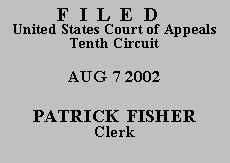

| DONALD STANLEY, JR., |
|
Mr. Stanley's § 1983 claim seeks damages and injunctive relief, alleging that the closure of the prison law library, and its replacement by an education resource center, deprived him of access to the courts and violated his Fourteenth Amendment rights to due process and equal protection.
After receiving Mr. Stanley's response, the district court dismissed Mr. Stanley's complaint with prejudice pursuant to 28 U.S.C. § 1915(e)(2) and Fed. R. Civ. P. 12(b)(6), and judgment entered on May 22, 2001. On June 27, 2001, Mr. Stanley filed his notice of appeal from the district court's judgment.
In his appeal to this court, Mr. Stanley argues that (1) this court has jurisdiction because he filed his appeal to this court in a timely manner, and (2) the district court erred in dismissing the civil rights complaint for failure to state a claim upon which relief can be granted.
We review the trial court's dismissal pursuant to Fed. R. Civ. P. 12(b)(6) de novo, applying the same standard as the district court. Perkins v. Kansas Dept. of Corr., 165 F.3d 803, 806 (10th Cir. 1999); See also Jefferson County Sch. Dist. No. R-1 v. Moody's Investor's Servs., Inc., 175 F.3d 848, 855 (10th Cir. 1999). A complaint should not be dismissed pursuant to Rule 12(b)(6) unless it appears beyond doubt that the plaintiff can prove no set of facts in support of his claim which would entitle him to relief. Conley v. Gibson, 355 U.S. 41, 45-46 (1957).
Before addressing the civil rights complaint, we note that a jurisdictional challenge has been raised on the ground that Mr. Stanley's notice of appeal was untimely. We conclude that his appeal to this court was timely. Judgment was entered on May 23, 2001. The notice of appeal was filed on June 27, 2001. The deadline for filing the appeal was June 22, 2001. See Fed. R. App. P. 4(a)(1)(A). A pro se prisoner's notice of appeal is deemed filed when it is delivered to prison officials for forwarding to the court. Fed. R. App. P. 4(c). Mr. Stanley supplied a copy of an inmate purchase order dated June 20, 2001 indicating payment for filing a notice of appeal, and a copy of his statement of account showing that a check with the same number as on the purchase order was disbursed to the district court on June 22, 2001. Mr. Stanley has provided sufficient documentation to show that the notice of appeal was given to prison authorities within the time prescribed for filing a notice of appeal.
Mr. Stanley has failed to state a claim under § 1983. The district court correctly noted that Mr. Stanley's allegations do not rise to a denial of access to the courts, because he has failed to show the required "relevant actual injury," Lewis v. Casey, 518 U.S. 343, 351 (1996), or otherwise allege active interference with his preparation and filing of legal documents. Id. at 350. Bounds v. Smith established a right of access to the courts, making access to law libraries or effective legal assistance two constitutionally acceptable methods of assuring meaningful access to the courts. 430 U.S. 817, 828 (1977). Bounds did not establish an "abstract, free-standing right to a law library or legal assistance." Lewis, 518 U.S. at 351. Mr. Stanley's § 1983 action may not rest on claims that his prison's "law library or legal assistance program is sub-par in some theoretical sense." Id. He must go one step further and demonstrate that the alleged shortcomings in the library or legal assistance program hindered his efforts to pursue a specific legal claim. Id. Mr. Stanley's claim cannot rest on a right to access the law library merely "to discover grievances, and to litigate effectively." Id. at 354 (emphasis in original).
As Mr. Stanley had no specific legal claim he was pursuing when the law library removed its materials, and he had access to counsel concerning his state proceedings, he has failed to make the requisite showing of actual injury.
We AFFIRM the district court's judgment.
We remind Mr. Stanley to continue making partial payments until the entire balance of the appellate filing fee is paid.
Entered for the Court
Paul J. Kelly, Jr.
Circuit Judge
*. This order and judgment is not binding precedent, except under the doctrines of law of the case, res judicata, and collateral estoppel. This court generally disfavors the citation of orders and judgments; nevertheless, an order and judgment may be cited under the terms and conditions of 10th Cir. R. 36.3.
2. After examining the briefs and the appellate record, this three-judge panel has determined unanimously that oral argument would not be of material assistance in the determination of this appeal. See Fed. R. App. P. 34(a); 10th Cir. R. 34.1(G). The cause is therefore ordered submitted without oral argument.